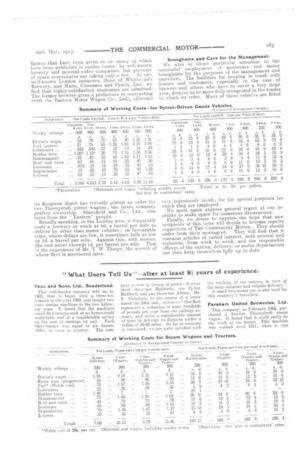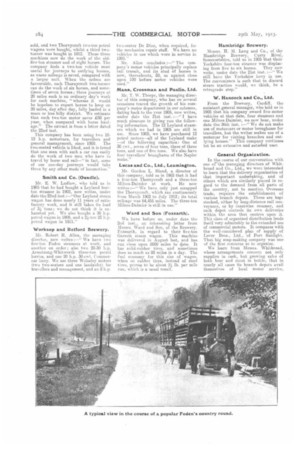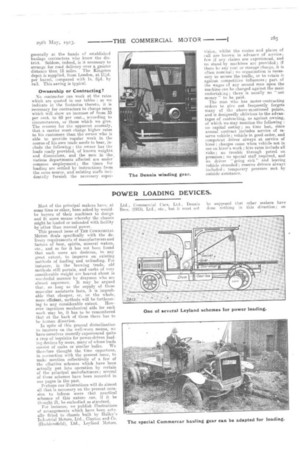"What Users Tell Us "-after at least 81 years of experience.
Page 15

Page 16

Page 17

If you've noticed an error in this article please click here to report it so we can fix it.
Vaux and Sons, Ltd.. Sunderland.
This well-known company told us, in 1905, that it began with a three-ton steamer in the year 1900, and bought two more similar machines in the two following years. It found that the machines could do journeys such as no horses could undertake, and at a considerable saving on the cost. of carriage by rail. Each three-tonner was equal to six horses, either in town or country. The corn
pany is now in favour of petrol: it owns three three-ton Hallfords, one 2A-ton Hallford, and one three-ton Albion. Mr. F. Nicholson. in the course of a letter dated the 24th inst., writes :-" Our fleet represents a reduction of some hundreds of pounds per year from our railway account., and saves a considerable amount of time in delivery to districts within a radius of 30-40 miles. So far as economy is concerned, we are quite satisfied with the wolking of our motors, in view of the more accurate and reliable delivery." A small two-seater car is also used for this company's travellers.
Farnham United Breweries, Ltd.
This company, in February 1905, purchased a five-ton Tbornycroft steam wagon. It found that it could easily do the work of six horses. This machine was worked until 1911, when it was
sold, and two Tbornycroft two-ton petrol wagons were bought, whilst a third twotonnes was bought in 1912. These three machines now do the work of the oldfive-ton steamer arid of eight horses. The company finds a two-ton vehicle most useful for journeys to outlying houses, as waste mileage is saved, compared with a larger unit. When the orders are favourable, each Thornyeroft two-tonner can do the work of six horses, and sometimes of seven horses; three journeys of 20 miles each is an ordinary d.ay's work for each machine, "whereas it would be hopeless to expect horses to keep on 20 miles, day after day, fully loaded in a more or less hilly district. We estimate that each two-ton motor saves £50 per year, when eompared with horse haulage." The extract is from a letter dated the 22nd inst.
This company has been using two 1012 h.p, motorcars, for travellers and general management, since 1908. The two-seated vehicle is liked, and it is found that one man with such a car can easily do the work of two men who have to travel by horse and rail—" in faet, some of our one-day journeys would take three by any other mode of locomotion."
Smith and Co. ((handle).
Mr. E. W. Ludlow, who told us in 1905 that he had bought a Leyland fourton steamer in 1902, now writes, under date the 22nd inst :—"Our Leyland steam wagon has done nearly 11 years of satisfactory work, and it still takes its load of 3i tons ; we do not think it is exhatrsted yet. We also bought a 30 h.p. petrol wagon in 1908. and a 4.-ton 25 h.p. petrol wagon in 1911."
Worksop and Retford Brewery.
Mr. Robert H. Allen, the managing director, now ',elites We have two five-ton Foden steamers at work, and another on order ; also two 28-30 h.p. Armstrong-Whitworth three-ton petrel lorries, and one 20 h.p. 30-cwt. (Ammerear lorry. We use three Wolseley motors (two two-seaters and one landauletj for travellers and management, and an 8 hie
two-seater De Dion, when required, for the mechanics repair staff. We have no vehicles in use which were in service in 1905'.
Alr. Allen concludes The company's motor vehicles principally replace rail transit, and its stud of horses is now, thereabouts, 50, as against close usped,,
ou100 before motor vehicles were
u
ou100 before motor vehicles were
u
Mann, Crossman and Paulin, Ltd.
Mr, T. W. Thorpe, the managing director of this conipany, who has on several occasions traced the growth of his company's motor department in our columns, dating back to the year 1905, now writes,
under date the 21st inst. I have much pleasure in giving you the following information. The 12 Leyland steamers which we had in 1905 are still in use. Since 1905, we have purchased 12 petrol motors—all of the Leyland make —of the following capacities: One of 30 cwt., seven of four tons, three of three tons, and one of five tons. We also have four travellers' broughams of the Napier make."
Liaca.s and Co., Ltd., Leamington.
Mr. Gordon L. Bland, a director of this company, told us in 1905 that it had a four-ton Thornyeroft and a three-ton Aliines-Daimler at work, He now writes:—" We have only just scrapped the Thornyeroft, which ran continuously from March 1902 to July 1912; its total mileage was 64,455 miles. The three-ton Milnes-Daimler is still in use."
Ward and Son (Foxearth).
Wo have before us, under data the 2nd inst., an interesting letter from Messrs. Ward and Son, of the Brewery, Foxearth, in regard to their five-ton Garrett steam wagon. This machine was delivered in August last, and has run close upon 8000 miles to date. It has solid-rubber tires, and sometimes does as much as 80 miles in a day. The fuel economy for this also of wagon, when on rubber tires, instead of steel tires, proves to be about 2 lb. per mile run, which is a usual result,
Hambridge Brewery.
Messrs. IL AI. Lang and Co., of the Hambridge Brewery, Curry Rivel, Somereetsliire, told us in 1905 that their Yorkshire four-ton steamer was displacing from five to six horses. They now write, under date the 21st in.st.:—" We still have the Yorkshire lorry in use. The convenience AS such that to discard steam traction would, we think, be a retrograde step."
W. Hancock and Co,, Ltd.
From the Brewery, Cardiff, the assistant general manager, who told us in 1905 that his company owned five motor vehicles at that, date, four steamers and one Milnes-Daimler, we now hear, under date the 26th inst. :—" We do not make use of motorcars or motor broughams for travellers, but the writer makes use of a motorcar for visiting branches and outlying houses." This company continues tot be an extensive and satisfied user.
General Organization.
In the course of our conversation with one of–the managing directors of Whitbread and Co., Ltd., we were interested to learn that the delivery organization of that important undertaking, and of others which are similarly placed in regard to the demand from all parts of the country, not to mention Overseas trade, requires the establishment of various branch depots. These are kept stocked, either by long-distance rail conveyance, or by coastwise steamer, and each depot controls its own deliveries within the area that centres upon it. This class of organized distribution lends itself very admirably to the extended use of commercial motors, It compares with the well-considered plan of supply of Lever Bros., Ltd., of Port Sunlight, That big soap-making company was one of the first concerns so to organize.
We learn from Messrs. Whitbread, whose arrangements concern not only supplies in cask, but growing sales of both beer and stout in bottle, that in nearly all cases its branch depots avail themselves of local motor service, generally at the hands of established haulage contractore who know the district. Seldom, indeed, is it necessary to arrange for road delivery over a greater distance than 15 miles. The Kingston depot is supplied, from London, at 114d. per barrel, compared with Is. Sid. by rail. This saving is typical.
Ownership or Contracting?
No contractor can work at the rates which are quoted in our tables : as we indicate in the footnotes thereto, it is necessary for contractors to charge rates which will show an increase of from 33 per cent. to 60 per cent., according to circumstances, or those which we give. The reasons for the apparent anomaly, that a carrier must charge higher rates to his customers than the owner who is able to provide regular work in the course of his own trade needs to bear, include the following : the owner has the loads ready provided, of known weights and dimensions, and the men in the various departments affected are under common employment; the times for loading are settled by instructions from the same source, and existing staffs incidentally furnish the necessary super
visiou, whilst the routes and places of tall are known in advance of service; few if any claims are experienced, and no stand•Ciy machines are provided ; if there be any rent or storage charge, it is often nominal; no organization is necessary to secure the traffic, or to retain it against competitive influences; part of the wages of any second man upon the machine can be charged against the main undertaking; there is usually no " out money " to be paid. The man who has motor-contracting orders to give out frequently forgets many of the above-mentioned points, and is designedly oblivious to the advantages of contracting, as against owning, of which we may mention the following : no capital outlay ; no time lost, since annual contract includes service of reserve vehicle ; vehicle in good order, and competent driver always at service of hirer: eharges cease when vehicle not in use on hirer s work ; hire rates include all risks: no trouble through petrol on premises ; no special staff required, and no driver " going sick" and leaving vehicle stranded ; reserve drivers always included ; temporary pressure met by outside assistance.






























